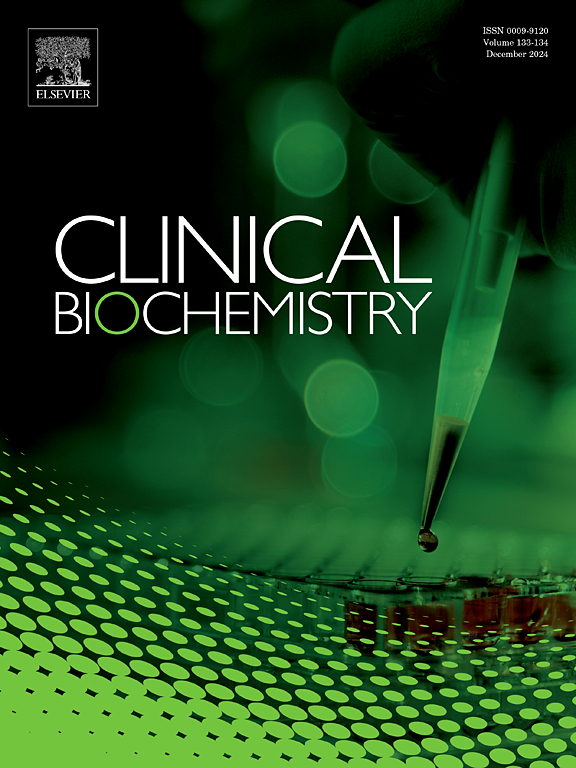Exploring the diagnostic potential of serum 5′tRF-Lys as a novel gastric cancer biomarker
IF 2.1
3区 医学
Q2 MEDICAL LABORATORY TECHNOLOGY
引用次数: 0
Abstract
Objectives
Gastric cancer (GC) is a global health challenge due to its asymptomatic early stages, low sensitivity of traditional serum biomarkers, and the invasiveness of endoscopy, resulting in delayed diagnosis and poor prognosis. The expression levels of tRNA-derived small RNAs (tsRNAs) significantly influence the emergence and development of malignancies. This study focused on the potential of tsRNAs as serum biomarkers for diagnosing GC.
Methods
Quantitative real-time PCR was used to measure 5′tRF-Lys expression levels, validated by agarose gel electrophoresis and Sanger sequencing. Kaplan-Meier survival curves assessed the association between 5′tRF-Lys expression levels and patient outcomes, while receiver operating characteristic (ROC) curves evaluated diagnostic accuracy. ROC curves showed that 5′tRF-Lys outperformed traditional serum biomarkers, and combining these markers can enhance diagnostic accuracy.
Results
The expression level of 5′tRF-Lys effectively differentiated GC patients from gastritis patients and healthy subjects. 5′tRF-Lys expression is negatively correlated with the T stage, lymph node metastasis, tumor-node-metastasis stage, neuro/vascular invasion, and positively correlated with tumor differentiation. Patients with low serum 5′tRF-Lys had a lower survival rate.
Conclusions
5′tRF-Lys shows promise as a sensitive and specific biomarker for GC, including early-stage detection and survival prognosis, offering potential clinical applications.
探讨血清5′trf -赖氨酸作为新型胃癌生物标志物的诊断潜力
目的胃癌(GC)早期无症状,传统血清生物标志物敏感性低,且内镜检查具有侵入性,导致诊断延迟和预后差,是全球性的健康挑战。trna衍生的小rna (tsrna)的表达水平显著影响恶性肿瘤的发生和发展。本研究的重点是tsRNAs作为诊断GC的血清生物标志物的潜力。方法采用实时荧光定量PCR检测5′trf - lys的表达水平,琼脂糖凝胶电泳和Sanger测序验证。Kaplan-Meier生存曲线评估5′trf - lys表达水平与患者预后之间的关系,而受试者工作特征(ROC)曲线评估诊断准确性。ROC曲线显示5′trf - lys优于传统的血清生物标志物,结合这些标志物可以提高诊断的准确性。结果5′trf - lys的表达水平能有效区分胃癌患者与胃炎患者及健康人。5′trf - lys表达与T分期、淋巴结转移、肿瘤-淋巴结-转移分期、神经/血管侵袭呈负相关,与肿瘤分化呈正相关。血清5′trf -赖氨酸水平低的患者生存率较低。结论5′trf - lys可作为一种敏感、特异的GC生物标志物,在早期检测和生存预后方面具有潜在的临床应用价值。
本文章由计算机程序翻译,如有差异,请以英文原文为准。
求助全文
约1分钟内获得全文
求助全文
来源期刊

Clinical biochemistry
医学-医学实验技术
CiteScore
5.10
自引率
0.00%
发文量
151
审稿时长
25 days
期刊介绍:
Clinical Biochemistry publishes articles relating to clinical chemistry, molecular biology and genetics, therapeutic drug monitoring and toxicology, laboratory immunology and laboratory medicine in general, with the focus on analytical and clinical investigation of laboratory tests in humans used for diagnosis, prognosis, treatment and therapy, and monitoring of disease.
 求助内容:
求助内容: 应助结果提醒方式:
应助结果提醒方式:


